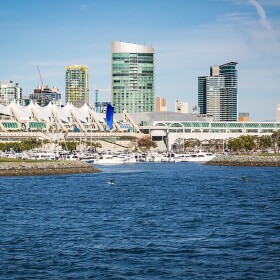The San Diego City Council on Monday voted to place a citizens' initiative that would fund an expansion on the Convention Center on the ballot in March 2020, eight months earlier than they had originally decided.
The 5-4 vote declared the council's intention to allow the measure to coincide with the presidential primary election. The council must later cast another vote officially placing the measure on the March 2020 ballot.
Council President Georgette Gomez and Councilwoman Jen Campbell sided with the council's three Republican members — Chris Cate, Mark Kersey and Scott Sherman — in approving the earlier vote. Campbell said the measure's funding for homeless programs were needed urgently.
"We can have better solutions now in these modern times for our citizens in need, and we need to get to it as quickly as we can," she said.
Other supporters of the measure said the November 2020 ballot could be crowded with other tax measures, dooming all of them to failure.
The initiative, titled Yes For A Better San Diego, would raise the tax paid by hotel guests visiting the city. Most of the money would go toward building the long-delayed expansion of the Convention Center, which supporters say will help attract more visitors and build up the local economy. The measure is forecast to bring in $5.9 billion over 42 years.
RELATED: MTS Polling Finds 2020 Tax Measure Within Reach
A smaller share of the revenue would be dedicated to homeless programs and affordable housing, and an even smaller portion would go toward city infrastructure.
Critics said the earlier vote was not in the spirit of a 2016 amendment to the City Charter called Measure L, which made November general elections the default time for voting on citizens' initiatives. Supporters of that measure argued at the time that primary elections were bad times to make important decisions because they typically attract fewer voters to the polls than November elections when congressional and presidential races are decided.
"This is an extremely important decision, and the voters said make the most important decisions when the most people vote," said City Councilman Chris Ward. "If we go down this path, Measure L effectively ceases to function at all."
Andrea Guerrero, executive director of the nonprofit Alliance San Diego, said moving up the vote on the Convention Center measure disrespected the nearly 66 percent of city voters who approved Measure L.
"We are setting ourselves up for manipulation," she said at a rally before Monday's council meeting. "We are setting ourselves up for special interests to control the outcome of these elections."
RELATED: Fallout From Failed Convention Center Expansion Measure Could Cost San Diego Millions
Although Measure L made November elections the default time to decide on citizens' initiatives, it also gave the City Council the authority to decide whether such matters should go to the voters sooner.
"Yes For A Better San Diego" was authored by a coalition of labor and business groups. They originally planned to have the measure ready for a vote in November 2018, but their signature-gathering campaign failed to get enough valid signatures to qualify in time. It has since qualified for the ballot.
Historically California law has required special taxes to be approved by two-thirds of voters, regardless of whether they are proposed by local governments or citizens. But a 2017 decision from the California Supreme Court left open the possibility that taxes placed on the ballot through signature-gathering campaigns could need a simple majority of 50% plus one.
Sixty-one percent of San Francisco voters approved such a tax measure last November, and Mayor London Breed has asked a judge to declare the initiative's success. The case could ultimately be appealed to the state Supreme Court.
If the San Diego hotel tax measure wins support from a majority of voters but fewer than two-thirds, it could become the subject of another protracted legal battle.









